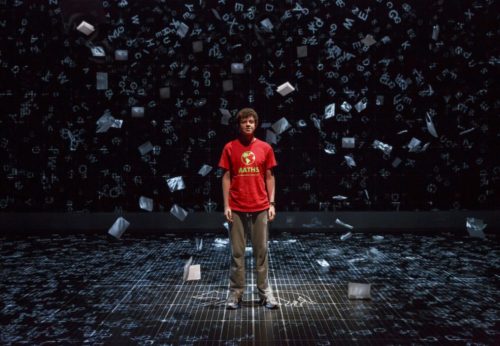
Christopher Boone in the touring production of The Curious Incident of the Dog in the Night Time/Photo: Joan Marcus
Based on the best-selling novel by Mark Haddon, this new play by Simon Stephens, directed by Tony-Award winner Marianne Elliott and presented by The National Theatre at the Boston Opera House (March 7-19) is full of bells and whistles and went on to win five Tony Awards including Best play. Given the accolades, the juiciness of the premise promising to usher us into the mind of a young mathematical savant who may have Asperger’s (the novel never uses that word), I had hoped for something ingenious. What I discovered was a tedious though perhaps faithful cataloguing of what someone on the autism spectrum might experience; but given the constant sensory overload modern life has inflicted on all of us, Christopher’s experience seemed almost ordinary.
That said, Adam Langdon as the young Christopher Boone is completely winning and credible in the role. Christopher has an acutely literal mind and thus considers “metaphor” a kind of “lie.” He can’t bear to be touched, fears strangers and germs, and has difficulty feeling and empathizing. When most folks are saying “hello” and trying to warm up to you, Christopher is most likely counting the hairs on your head–and getting it right.
As Christopher sets out Sherlock Holmes-like to solve the mystery of the murdered mutt, he records his efforts in a diary which his teacher Siobhan (Maria Elena Ramirez) reads aloud, a theatrical device which puts us inside Christopher’s head. His odyssey takes him out of his comfort zone as he interrogates the neighbors about the incident. We also come to learn about his flawed family– a hot-tempered father Ed (Gene Gillette), his caring and also careless mother Judy (Felicity Jones Latta) and their clueless extramarital partners. None of these characters or made much sense or won my sympathy. Their approaches to life were infinitely less transparent than that of their literal-minded son as he tries to make sense of these parents, their entanglements, and the world around him.
By the end of ACT I the “mystery” of the pierced pooch is blunted, and Act II puts us on several interminable train rides which involve Christopher learning the ways of the world: using a cash machine, buying a ticket, using a bathroom on a train, avoiding the police, hiding amidst the luggage, and chasing his pet rat around the third rail. A little of this goes a long way. The remaining drama hinges on the screwy behaviors of his parents and their pals, and puts maximum strain on the sets, lighting, sound, and staging.
It IS quite a set designed by a Tony-award winning design team: a mostly darkened proscenium ringed by the actors, some in multiple roles, who step forward or enter from the audience on cue, and into a space which is enveloped floor to ceiling by a huge grid. (Given the projections on the floor, I wondered why the stage wasn’t raked so we could see it too.) This grid is a portal to Christopher’s external and internal life: it lights up, sometimes with streaks of rain to indicate the weather, or with Christopher’s diagrams, or his dreams of being an astronaut, or maps of the city, or numbered addresses of his neighborhood. Sometimes the actors carry Christopher around so that he appears to be walking up the walls, or tumbling unfettered through space. At other times whenever he is exposed to the cacophony of everyday urban life, Christopher’s synapses become overloaded and the stage explodes in a storm of light and sound. A little of this also goes a long way– and feels mighty literal itself.
So yes, we all have different ways of communicating, but by bravely risking a trip beyond our usual parameters we might just grow, and like Christopher– grow up. But “The Curious Incident of the Dog in the Night-Time” settles for theatricalizing rather than dramatizing, and the overblown staging doesn’t make up for what’s missing, a way to make this material new, compelling, or revelatory. The final blow for me occurred in the play’s ending, a shameless grab for my affection involving the original canine conundrum.
At the curtain, I fled. But apparently after the bows, the cast fulfilled a promise made earlier in the play to reveal the answer to a mathematical theorem. I confess, I missed it; but after almost 2 hours and 45 minutes? Stick a fork in me- I’m done.

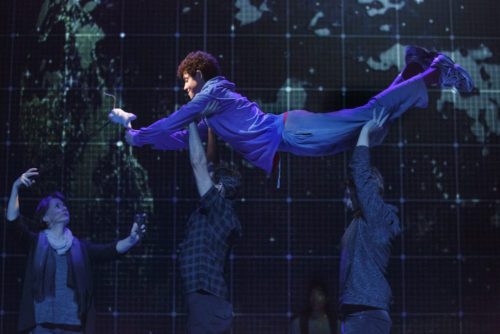
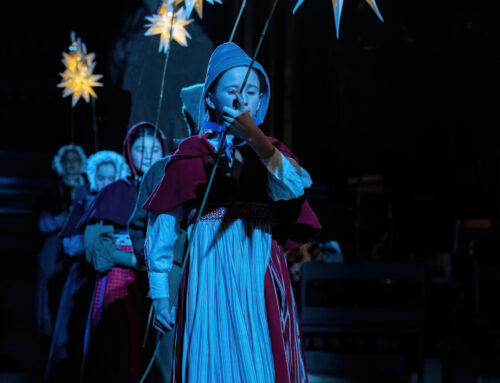

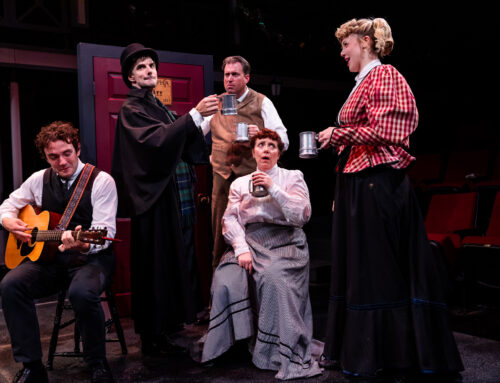

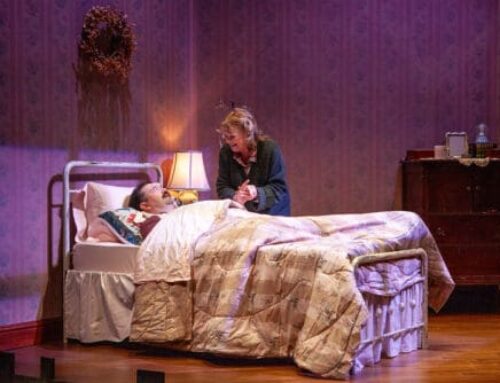
Leave A Comment
You must be logged in to post a comment.